Drafted by a former College president and current consultant, the document contains extreme provisions solely intended to allow the Community College president to control an elected Governing Board member’s behavior and speech when it comes to the taxpayer supported institution
 OPINION: The outgoing Yavapai Community College District Governing Board, with two lame-duck members, convened on November 21 at the Prescott Campus, where one of the major issues was a controversial resolution drafted by current consultant and former college president Dr. David Borofsky. The resolution’s main purpose appears aimed at stifling and controlling the free speech and behavior toward faculty and staff of elected Board members. As written, the resolution raises serious concerns about transparency and accountability.
OPINION: The outgoing Yavapai Community College District Governing Board, with two lame-duck members, convened on November 21 at the Prescott Campus, where one of the major issues was a controversial resolution drafted by current consultant and former college president Dr. David Borofsky. The resolution’s main purpose appears aimed at stifling and controlling the free speech and behavior toward faculty and staff of elected Board members. As written, the resolution raises serious concerns about transparency and accountability.
Dr. Borofsky, now the Executive Director of the Arizona Association of Community College Trustees (AACCT), has a history intertwined with Yavapai College leadership. Borofsky was the Interim-Executive Director of the Arizona Association of Community College Trustees (AACCT), a group that included Yavapai Community College Board Chair, Deb McCasland. He is now the executive director of the Arizona Association of Community College Trustees (AACCT), a group that includes Yavapai Community College president Dr. Lisa Rhine.
Notably, Borofsky’s tenure as a college leader has not been without controversy. For example, it was reported that at Dakota State University he unexpectedly resigned when students began organizing petitions “to then President Borofsky—who was primarily suspected for pressuring the changes in leadership—asking for answers to why these decisions were made.” The claim was that “several high profile administrators” had stepped down, and it “was believed by many students and faculty that these administrators had not stepped down willingly.”
It was also reported that Jack Warner, executive director of the Board of Regents, “managed to confirm a suspicion that students . . .held since the incident: Doctor Borofsky’s choice to leave was a quick development, and was certainly made because of the poorly received decisions.”
At the November Yavapai Community College Governing Board meeting, Third District Representative Toby Payne asked Chair McCasland who had initiated the request for Borofsky to draft the resolution. McCasland admitted she had done so.
The resolution presented by Borofsky to the Board, which was published in full in a November 16 blog post, is overall an extreme document designed to muzzle dissent and enforce rigid control over Board members. Among its provisions, it prohibits Board members from making any comments about the College president that could be construed as negative. Thus, the Third District representative Toby Payne, under this resolution, can never raise critical questions with his constituents about the lack of attention or development by the college leadership in his district. Even more troubling, the Resolution bans Board members from engaging with community college staff or faculty in any way on any issue involving the College or the community.
This resolution lays bare the administration’s profound fear of criticism and its desire to silence opposing voices. It exemplifies a culture of authoritarian control, where dissent is not tolerated, and open dialogue, some of which may be considered critical, is actively suppressed. Such measures are a blatant affront to the principles of governance and transparency that should guide a public institution.
In essence, the resolution reflects an unsettling effort to insulate the College leadership from accountability at the expense of the public’s trust. The five elected officials on the lame duck Governing Board should have resisted the blatant attempt to undermine their ability to represent their constituents and upheld their responsibility to advocate for transparency and fairness. Anything less is a disservice to the residents of Yavapai County who they are sworn to serve. Moreover, it is a disservice to democracy.
Unfortunately, the 4-1 vote cast by the lame duck representatives who approved this resolution at Tuesday ‘meeting does not reflect either these concerns or basic democratic values.
 Yavapai Community College pays $3,300 annually to participate in the Bellwether College Consortium, according to the organization’s website. This prestigious consortium recognizes outstanding and innovative programs among community colleges across the United States and its territories.
Yavapai Community College pays $3,300 annually to participate in the Bellwether College Consortium, according to the organization’s website. This prestigious consortium recognizes outstanding and innovative programs among community colleges across the United States and its territories. Editorial: In a move that appears calculated to consolidate power and preempt scrutiny, Yavapai Community College leadership has presented a resolution that will be discussed and voted on at Tuesday’s meeting. The resolution, apparently prepared with the cooperation of an outside consultant, is designed to significantly curtail the authority of its Governing Board.
Editorial: In a move that appears calculated to consolidate power and preempt scrutiny, Yavapai Community College leadership has presented a resolution that will be discussed and voted on at Tuesday’s meeting. The resolution, apparently prepared with the cooperation of an outside consultant, is designed to significantly curtail the authority of its Governing Board. Yavapai County School Superintendent Tim Carter has initiated the process of filling the Yavapai Community College District Governing Board seat soon to be vacated by District 4 representative Chris Kuknyo. This District includes North Prescott, Chino Valley, Paulden, Ash Fork, Seligman, and surrounding areas. Kuknyo will remain on the Board until December 31, 2024, and the new appointment is expected to be finalized and announced by December 18, 2024.
Yavapai County School Superintendent Tim Carter has initiated the process of filling the Yavapai Community College District Governing Board seat soon to be vacated by District 4 representative Chris Kuknyo. This District includes North Prescott, Chino Valley, Paulden, Ash Fork, Seligman, and surrounding areas. Kuknyo will remain on the Board until December 31, 2024, and the new appointment is expected to be finalized and announced by December 18, 2024. The Yavapai Community College District Governing Board will hold a meeting on Tuesday, November 19, 2024, at the Rock House on the Prescott Campus. The meeting is scheduled to begin at 1:00 p.m. and is expected to last approximately three hours. A live video stream will be available on YouTube.
The Yavapai Community College District Governing Board will hold a meeting on Tuesday, November 19, 2024, at the Rock House on the Prescott Campus. The meeting is scheduled to begin at 1:00 p.m. and is expected to last approximately three hours. A live video stream will be available on YouTube.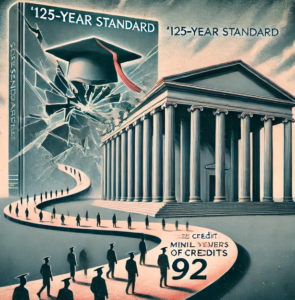 Colleges and universities typically require 120 credits for a B.A. degree, as this standard reflects the nation-wide amount of study time deemed necessary for comprehensive understanding in a subject area. This requirement includes both general education courses across various disciplines and focused coursework within a chosen major. The 120 credits are intended to ensure students graduate with adequate preparation for the workforce, balancing broad education with specialized knowledge in their field.
Colleges and universities typically require 120 credits for a B.A. degree, as this standard reflects the nation-wide amount of study time deemed necessary for comprehensive understanding in a subject area. This requirement includes both general education courses across various disciplines and focused coursework within a chosen major. The 120 credits are intended to ensure students graduate with adequate preparation for the workforce, balancing broad education with specialized knowledge in their field.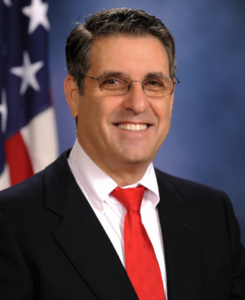
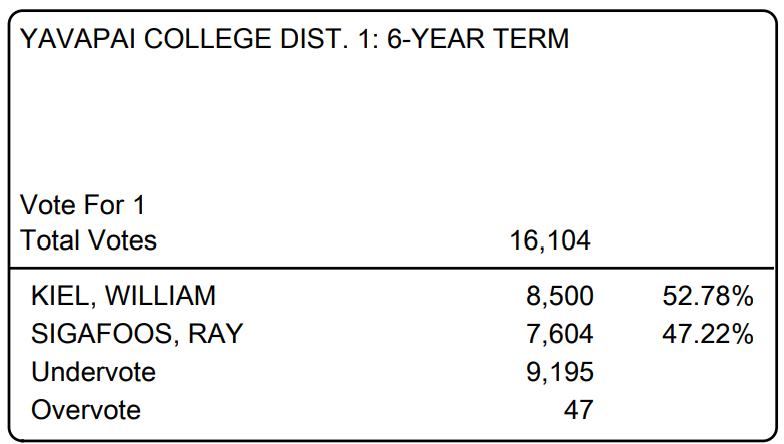
 OPINION: For over 50 years, Yavapai Community College leadership has focused its efforts on building an extensive music program exclusively on the Prescott Campus. Throughout this time, it has neglected to make similarly accessible music instruction reasonably available to students in other parts of Yavapai County. With the approval of the District Governing Board, this concentrated effort has resulted in a full range of music courses being offered solely in Prescott—such as music theory, piano classes, music appreciation, private lessons, and performance ensembles. This focus has also produced impressive student music groups, including the Master Chorale, Community Chorale, Women’s Chorale, Chamber Singers, Concert Band, Symphonic Band, Symphony Orchestra, and Jazz ensembles, providing students with opportunities to develop their musical talents collaboratively. Additionally, the Community College now offers an Associate of Arts in Fine Arts degree with a concentration in Music—yet music instruction in person is provided only on the Prescott Campus.
OPINION: For over 50 years, Yavapai Community College leadership has focused its efforts on building an extensive music program exclusively on the Prescott Campus. Throughout this time, it has neglected to make similarly accessible music instruction reasonably available to students in other parts of Yavapai County. With the approval of the District Governing Board, this concentrated effort has resulted in a full range of music courses being offered solely in Prescott—such as music theory, piano classes, music appreciation, private lessons, and performance ensembles. This focus has also produced impressive student music groups, including the Master Chorale, Community Chorale, Women’s Chorale, Chamber Singers, Concert Band, Symphonic Band, Symphony Orchestra, and Jazz ensembles, providing students with opportunities to develop their musical talents collaboratively. Additionally, the Community College now offers an Associate of Arts in Fine Arts degree with a concentration in Music—yet music instruction in person is provided only on the Prescott Campus.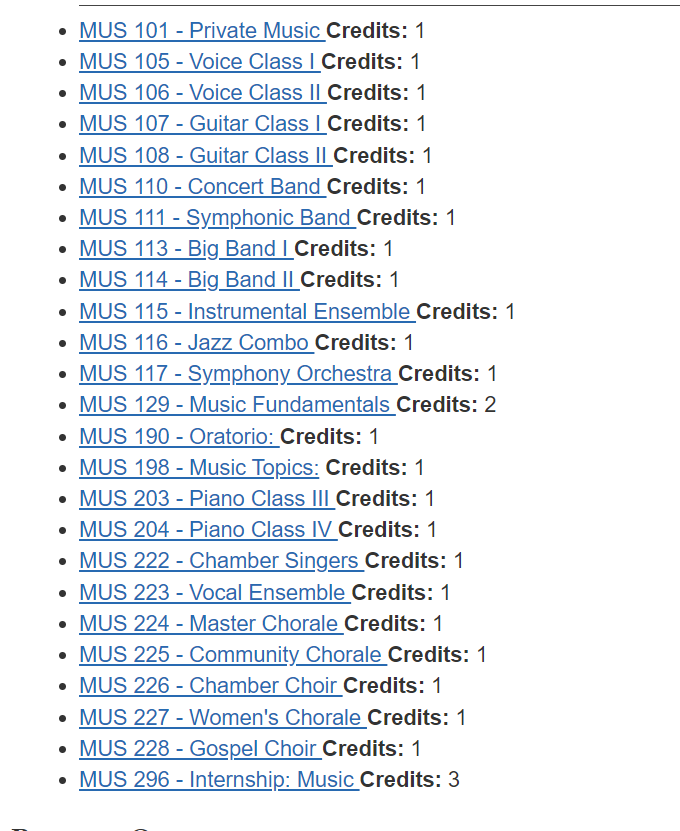 The Expansive Reach of Yavapai County
The Expansive Reach of Yavapai County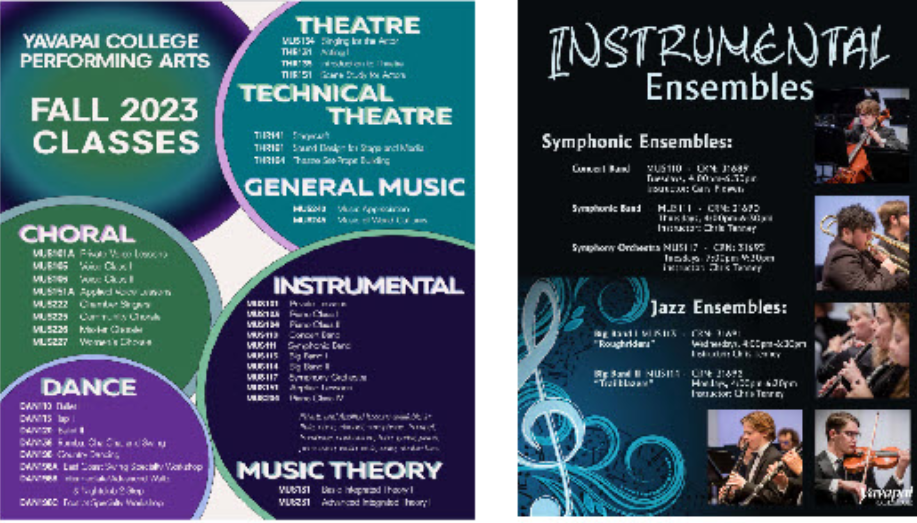 Barriers to Student Success
Barriers to Student Success Tuition increases at Yavapai Community College are annually approved by the District Governing Board with little significant questioning, discussion, or commentary. The meeting on October 29, concerning the requested tuition increase for the 2025-2026 academic year, was no exception. It mirrored last year’s presentation of the topic, which lasted just eight minutes. This year, the presentation and Board vote took only twelve minutes of the meeting.
Tuition increases at Yavapai Community College are annually approved by the District Governing Board with little significant questioning, discussion, or commentary. The meeting on October 29, concerning the requested tuition increase for the 2025-2026 academic year, was no exception. It mirrored last year’s presentation of the topic, which lasted just eight minutes. This year, the presentation and Board vote took only twelve minutes of the meeting.